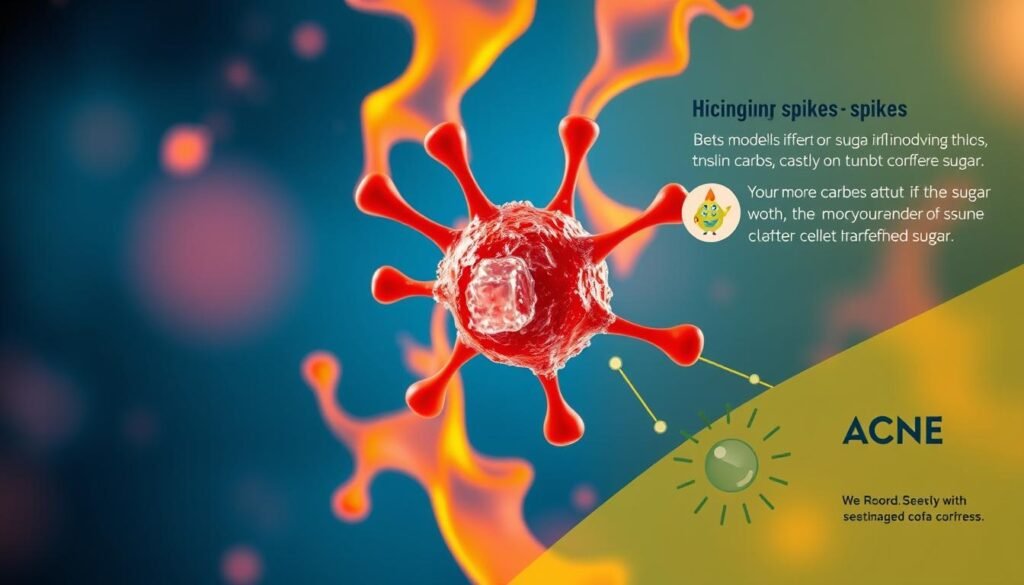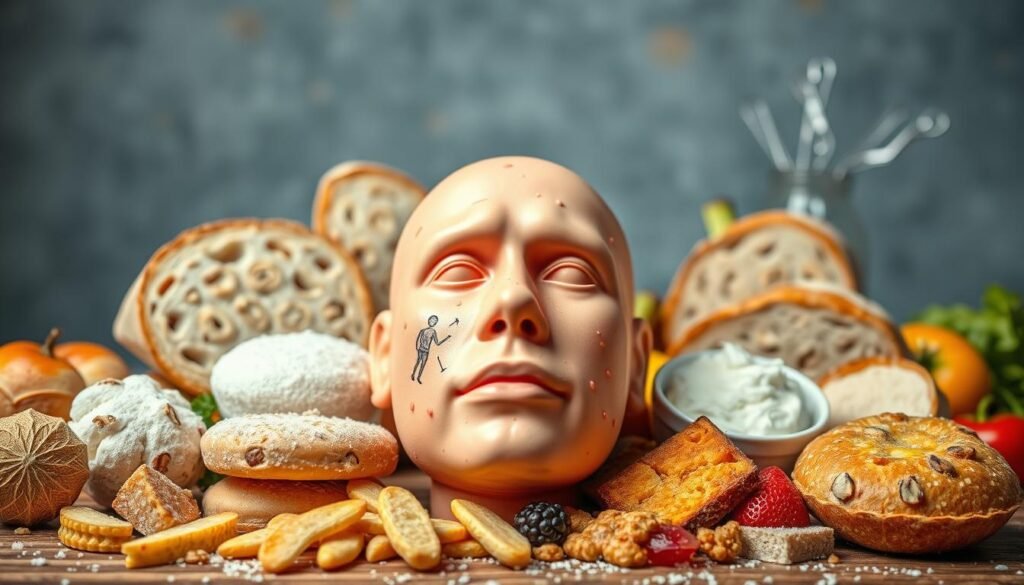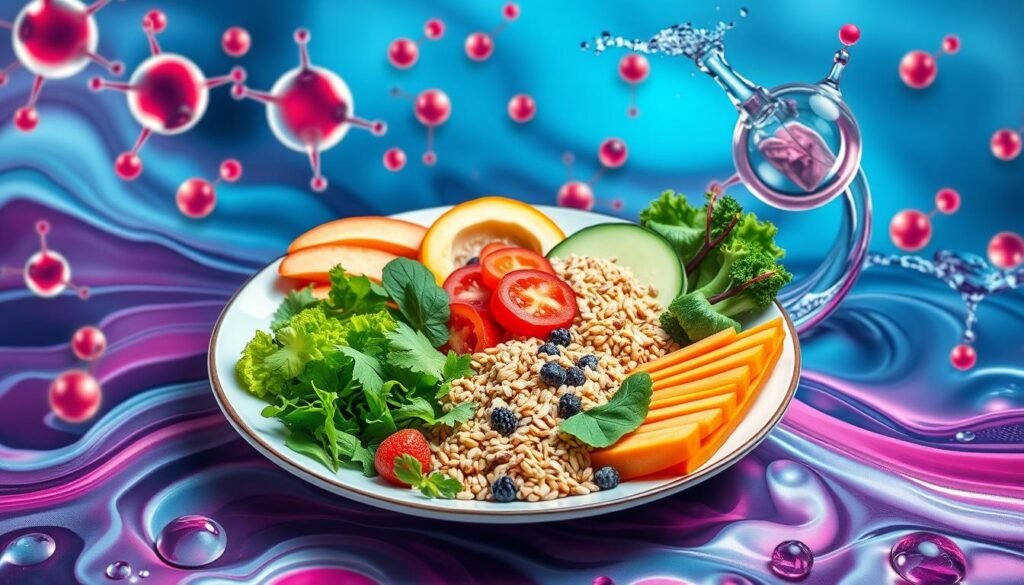About half of the people aged 20-29 face acne issues. This shows how common the problem is, sparking many discussions in science about its causes. Acne mainly comes from too much sebum, changes in hormones, and bacteria. Now, refined carbs and acne are being linked too. Foods like white bread and sweet drinks could be causing acne. Long ago, thinkers like Hippocrates believed food affects skin health. Yet, today’s studies don’t have a clear answer on how diet and acne are connected.
Studies now show that eating lots of refined sugars and high glycemic foods can cause blood sugar levels to spike. This can lead to inflammation, making acne worse. This has led to interest in a low-glycemic diet for better skin. While the American Academy of Dermatology won’t say to change your diet for acne, knowing how food affects the skin is key to managing it.
Key Takeaways
- Refined carbohydrates and high glycemic foods are linked to increased acne risk.
- Inflammation triggered by these foods may exacerbate skin issues.
- Dietary interventions like a low-glycemic diet may help manage acne.
- Balancing blood sugar through regular, nutritious meals is beneficial for skin health.
- Current scientific research provides insights, but a definitive connection between diet and acne is still emerging.
The Connection Between Diet and Skin Health
The link between diet and skin health has been closely studied. The focus is on how our diets affect skin problems like acne. Foods filled with refined carbs and sugars can make skin issues worse. They may cause inflammation that harms our skin. A study in the USA found that a low-glycemic diet helped 87% of participants see less acne. Also, 91% used fewer acne treatments.
This trend is not just in the USA. In Australia, men eating a low-glycemic diet for 12 weeks saw their acne improve. In Korea, a similar diet led to noticeable acne reduction in just 10 weeks.
What we eat matters a lot for food influences on acne. In Turkey, a study showed that a high-glycemic diet was linked to worse acne. In Italy, consuming cow’s milk was related to more acne cases. Women who drank two or more glasses of skim milk a day had a 44% higher acne chance. Malaysia reported similar findings with diets high in cow’s milk and high-glycemic foods.
The effects of nutrition and skin health are significant. Reducing high glycemic index foods led to fewer acne outbreaks, studies show. A Mediterranean-style diet is often suggested. It’s full of fish, fruits, vegetables, whole grains, and olive oil. This diet helps skin health a lot.
Though these findings are encouraging, more research is needed. We should understand how different diets affect acne. Eating a balanced diet and proper skin care can improve skin. For those curious about diet’s role in skin health, especially the link between dairy and acne, more info is available. Check it out at this link.
Understanding Acne Vulgaris
Acne vulgaris is a skin condition that affects nearly 10% of people worldwide. It is most common in teens but can also affect adults. The main causes of acne include clogged pores due to excess sebum, dead skin, and bacteria like Cutibacterium acnes. These lead to the well-known acne spots.
The causes of acne are many. Hormonal changes, like those during puberty, can raise oil production. Also, what you eat matters. Eating lots of refined carbs and sugars might make acne worse. This is because they affect your blood sugar levels.
Research shows a link between acne and certain foods. Foods like low-fat dairy products have a strong link to acne. Foods high in sugar and simple carbs, like white bread, increase your risk too. Eating antioxidant-rich foods like nuts, berries, and veggies may help your skin stay healthy.
Knowing how acne works can help you treat it better. Eating right and avoiding triggers are key steps. This way, you can help keep your skin healthier.
Refined Carbs and Acne: What Science Tells Us
Recently, the impact of refined carbs on our skin has gotten a lot of focus. Learning about types of refined carbohydrates like white bread, sweet treats, and sodas helps us understand their effects on acne. Many studies have found that eating lots of these foods can make acne worse.
Main Types of Refined Carbohydrates
Some common refined carbs are:
- White bread
- Pasta
- Rice
- Pastries and cakes
- Sugary cereals
- Soft drinks and juices
Types of refined carbohydrates lead to quick increases in blood sugar. This boost in blood sugar makes insulin levels go up. Insulin matters because it makes more sebum, which can cause more acne. A review across 27 studies showed that low-glycemic diets helped reduce acne in young men and teenagers.
The Role of High Glycemic Index Foods
High Glycemic Index foods spike blood sugar fast, leading to higher insulin production. This extra insulin can make sebaceous glands produce more oil, possibly causing blocked pores and acne. Many studies link high-glycemic foods to acne, but we need more research for a clear cause and effect. However, the current evidence underlines the role of diet in managing skin conditions.
For more information on how diet affects acne, check out this study for an in-depth look at food and skin health.
Blood Sugar Spikes and Inflammation
Blood sugar spikes happen when high-glycemic foods quickly raise glucose in the bloodstream. This causes the body to release insulin, helping sugar go into cells. But, these spikes can cause inflammation in the body, hurting skin health.
Studies show a link between eating high glycemic index foods and inflammation and acne. High insulin levels can make more sebum. This oil, along with dead skin, can clog pores. This not only makes acne worse but also can scar the skin and make it look bad.

A big review looked at 410 articles about diet and acne. Only 34 of these studies met the high standards needed. They all agree that eating lots of refined carbs can make acne worse.
Studies show that people who eat mostly low-glycemic foods and less dairy have less acne. This is different from Western diets that are high in sugars and lead to skin problems.
To manage acne well, it’s key to understand how diet affects it. Knowing which foods cause blood sugar spikes and inflammation helps. Eating a balanced, low-glycemic diet can improve skin health and reduce acne.
Insulin Resistance: A Trigger for Acne
Insulin resistance is key in causing acne vulgaris. It worsens skin problems by affecting body processes. Studies look at how insulin imbalances link to more severe acne. Knowing this can help find natural ways and diet changes to improve skin.
How Insulin Affects Sebum Production
Insulin controls sebum, the oil that blocks pores when too much is made. If insulin resistance happens, the body makes more insulin. This action increases sebum. Insulin resistance means more insulin in the blood. This leads to oilier skin and creates a good environment for acne.
Insulin-Like Growth Factor 1 (IGF-1) and Acne
IGF-1’s role in acne is important due to its relationship with insulin. IGF-1 levels go up with high sugar diets, causing more sebum and skin inflammation. The connection between IGF-1 and acne is a concern. High sugar foods spike insulin, making acne worse.
Eating foods with a low glycemic index may help clear skin. It does this by reducing insulin resistance problems. These include inflammatory issues and too much oil.
Dietary Triggers for Breakouts
Some foods can really impact acne. Refined sugars and dairy products are big ones that affect skin health.
Refined Sugars and Their Impact on Skin Health
Eating a lot of refined sugars can cause inflammation. This inflammation is connected to acne. High-glycemic foods lead to blood sugar ups and downs. These changes make insulin levels go up. This can increase sebum production and clog pores. Studies show that eating sugary foods a lot is linked to a 54% higher acne risk. Sugar-rich drinks also up the risk by 18%.
The Role of Dairy Products in Acne Development
Dairy products could trigger acne, studies say. Cow’s milk can raise insulin levels because of its hormonal content. This can lead to more acne. Whey protein is also linked to worse acne for some. Cutting down on dairy might help people with acne. It’s a way to avoid foods that could make skin problems worse.

| Food Type | Increased Risk of Acne (%) |
|---|---|
| Refined Sugars | 54 |
| Sugary Beverages | 18 |
| High-Fat Diets | 43 |
| Fried Foods | 17 |
| Whey Protein Supplements | Varies |
Changing your diet can help manage acne. It shows how important smart nutrition choices are for skin health.
Adopting an Anti-Inflammatory Foods Approach
Adding anti-inflammatory foods to your diet can boost your skin’s health. Eating foods that nurture the skin helps fight acne and improves your complexion. Include foods high in antioxidants, polyphenols, and omega-3 fatty acids to build your diet.
Foods to Include for Clearer Skin
For better skin, add these foods to your meals:
- Fatty fish: Salmon, mackerel, and tuna have omega-3 fatty acids. They fight inflammation.
- Leafy greens: Spinach, kale, and broccoli are full of nutrients and antioxidants.
- Berries: Blueberries and strawberries are loaded with vitamins to combat inflammation.
- Nuts and seeds: Almonds and flaxseeds offer healthy fats for skin health.
- Extra-virgin olive oil: Use this oil in cooking and dressings for its anti-inflammatory effects.
Fill half your plate with fruits and veggies for best skin nutrition. A colorful plate aids digestion and fights inflammation.
The Importance of Omega-3 Fatty Acids
Omega-3 fatty acids are key for skin health and fighting acne. They reduce inflammation and improve the skin’s barrier. Adding omega-3-rich foods to your diet can lessen acne problems.
To get enough omega-3s, eat 2-3 servings of omega-3-rich foods weekly. Fatty fish and plant options like flaxseeds are good choices. They help make your skin look better.
These changes, along with the right skincare after exercising, can boost your diet’s effect. For more on exercise and acne, check out this link.
Strategies to Balance Hormone Levels
Understanding how to balance hormones is key in managing acne. Hormonal imbalances often lead to acne, especially during puberty or with conditions like PCOS. These changes in hormone levels can cause the skin to produce more oil. This, in turn, can cause breakouts.
Understanding Hormone Imbalance and Acne
Many don’t see the connection between hormone imbalances and acne. Studies highlight that high glycemic foods increase acne in Western diets, lacking in nutrients. Areas with diets low in GI foods tend to have fewer acne problems. Dairy, especially cow’s milk, is also linked to higher rates of acne. Not to forget, refined sugars and carbs can make hormonal imbalances worse.
Potential Dietary Adjustments to Consider
Some diet changes can help balance hormones. Important Acne Dietary Strategies are:
- Choosing a low glycemic-index diet with non-starchy veggies, whole grains, and fruits helps keep blood sugar levels steady.
- Adding omega-3 fats from fish, nuts, and seeds can lower inflammation and improve hormone levels.
- Switching to milk alternatives might reduce the acne linked to cow’s milk.
- Eating foods rich in antioxidants, like Brazil nuts and blueberries, supports skin health.
Combining a balanced diet with understanding hormone levels can greatly help manage acne.
| Food Type | Example Foods | Benefits |
|---|---|---|
| Low GI Foods | Non-starchy vegetables, whole grains | Stabilizes blood sugar, reduces acne |
| Omega-3 Fatty Acids | Oily fish, chia seeds | Lowers inflammation, helps balance hormones |
| Antioxidant-rich Foods | Blueberries, leafy greens | Enhances overall health, may reduce acne risk |

Exploring the Glycemic Index
The Glycemic Index (GI) helps those wanting better skin, particularly with acne. Knowing the difference between high and low-glycemic foods aids in making meals that keep blood sugar stable. This can lead to clearer skin.
By picking Low-Glycemic Foods, you might see fewer insulin spikes. This means less oil production and fewer breakouts.
Low-Glycemic Foods That May Help
Foods like whole grains, legumes, fruits, and vegetables are good for your skin. These Low-Glycemic Foods let your body slowly absorb sugar. This prevents sudden insulin jumps caused by high-glycemic snacks and sugary drinks.
Eating these better options regularly can help keep your skin clear. It also improves your body’s nutrient levels.
Comparing High-Glycemic and Low-Glycemic Diets
Many studies show big differences between High and Low-Glycemic Diets on acne. Those on a low-glycemic diet often have less severe acne and healthier skin. On the other hand, high-glycemic foods may lead to more inflammation and worse acne.
Switching to a low-glycemic diet is good for both your skin and overall health.